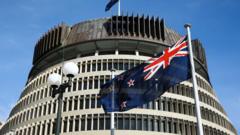The Speaker of New Zealand's Parliament, Gerry Brownlee, has made it clear that he will not entertain further complaints from lawmakers regarding the use of the Māori name Aotearoa in parliamentary discussions. His ruling came after a request from Deputy Prime Minister Winston Peters to prohibit the name, arguing that it should only be used after a national referendum. While the legal name for the country remains New Zealand, Aotearoa, which translates to "land of the long white cloud," has been widely embraced in both Māori culture and official documents, including passports and currency.
On Tuesday, Brownlee emphasized that if certain MPs object to using Aotearoa, they are not obliged to adopt it in their speech. The Parliament's three official languages—English, Māori, and New Zealand sign language—permit lawmakers to raise issues in any of these languages. Peters' criticism originated last month when Green MP Ricardo Menéndez March, a naturalized New Zealand citizen from Mexico, referred to the country as Aotearoa during parliamentary proceedings. Peters challenged the legitimacy of a newcomer altering the country's name without the public’s consent.
Fellow New Zealand First party member Shane Jones echoed Peters' concern, questioning the impact of recent immigrants on the discourse surrounding Māori traditions. Brownlee suggested using the phrase Aotearoa New Zealand to avoid misunderstandings, while stressing that it was entirely at the discretion of the parliamentarians involved.
The use of Aotearoa does not resonate equally with all Māori, as its original application referred primarily to New Zealand's North Island. Regardless, non-Māori individuals often use this term as a sign of respect towards the indigenous population. Peters maintained that his opposition lies specifically with the inclusion of Aotearoa in parliamentary proceedings, asserting he would refrain from responding to any future inquiries framed in that context.
The visibility of Māori is increasing in public life across New Zealand, following vigorous advocacy from indigenous representatives. A previous petition initiated by the Māori Party to officially rename the country Aotearoa garnered over 70,000 endorsements. Critics argue that the name New Zealand, with its Dutch origins, lacks a connection to indigenous culture, prompting discussions about identity and representation.
The current administration has directed government entities to favor English in communications, particularly on matters irrelevant to Māori. Moreover, the Act Party, part of the governing coalition, seeks to redefine aspects of the Treaty of Waitangi, New Zealand's foundational document, which has incited significant opposition from various groups.




















